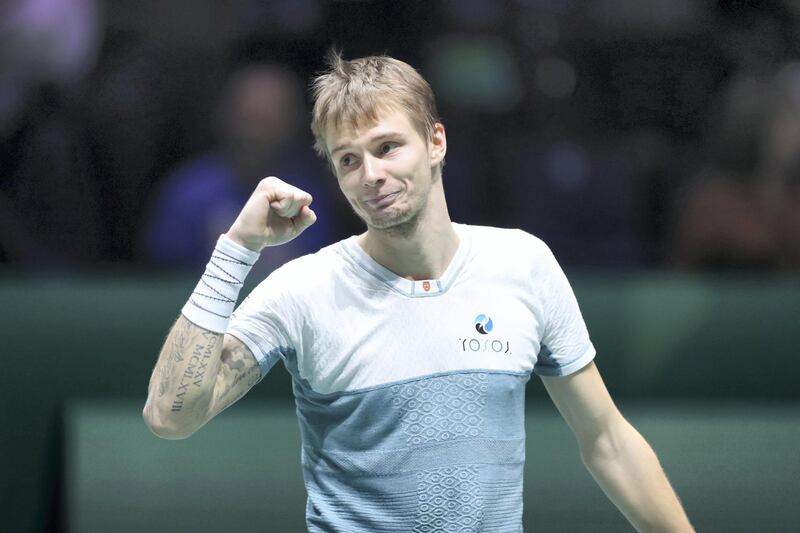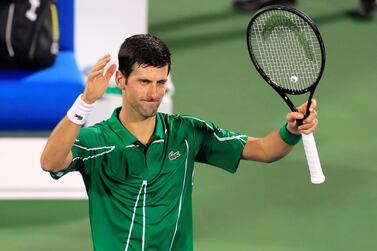When Alexander Bublik learns he might face Stefanos Tsitsipas in the second round in Dubai on Wednesday, the 22-year-old Kazakh immediately rolls his eyes.
"That's the face you make when you play Stef. You'll see it on court if Stef wins and I end up playing him; that's the face," Bublik tells The National following his 6-2, 7-5 victory over Polish world No 30 Hubert Hurkacz on Tuesday.
It would be a second meeting in five days between Bublik and Tsitsipas, the Greek emerging victorious in their Marseille semi-final last Saturday en route to a successful title defence.
Would he do anything differently if he gets the rematch so soon after their last showdown?
“It’s the same, you play a top-10 player, he’s good, he’s on a run. Not to shame yourself out there and play a good match,” Bublik says.
The entertaining Russian-born Kazakh is quite the character. On court, he pulls out tweeners and underarm serves on demand, surprising his opponents with a mix of power and flair.
Off court, he speaks his mind, which explains why he has generated many headlines, most recently for telling L'Equipe last week that he "only plays tennis for the money".
Bublik is not the only tennis player out there to claim they don’t enjoy their sport – Nick Kyrgios and Andre Agassi have famously confessed that they hated tennis. For Bublik, his main problem is with the grind, not with tennis itself.
He admits he played a sloppy match against Hurkacz because he landed from Marseille on Monday morning, after a 12-hour plane delay at Istanbul airport; he then slept all day in Dubai before taking to the court on Tuesday for his opening match.
“I think we played the worst ATP match of 2020. We both were playing pretty bad. But I managed to be the better worse player today, managed to win, I’m happy to get through. It’s as simple as that,” was Bublik’s assessment of his success against Hurkacz.
“I love tennis but I don’t like the competing part of it. It’s like I said, I arrived 10 o’clock on Monday morning and I’ve got to play and if I lose, I lose my spots in the ranking, I lose the money, and after that I get a ton of stupid questions and bullying on social media, whatever, people texting me.
“This is only in tennis I guess, you don’t see this in basketball. If I arrive later in the NBA team and I’m like, ‘Yo, coach, I can’t play, please’. I can play five minutes maybe and make my three-pointers and stuff. And then you feel better. Less injuries, you don’t have grey hairs at the age of 30 probably because you’re all the time here, it’s different.”
Bublik, who is at a career-high ranking of 47 this week, has had a strong 13 months, rising more than 100 spots in the charts.
He reached his first two ATP finals last season – in Newport and Chengdu – and has been consistently improving. But Bublik, who has a tattoo of a skeleton that signifies to him everything he has to endure in tennis – does not have a clear explanation behind his ascent.
“I don’t believe in practicing and that practice makes you better. Practice makes you better but you never know when it’s going to happen. So you just keep practicing and then boom you’re top 50, or you are 350,” he says.
“I haven’t changed so much. Yes, I’m sure [it’s more mental]. I don’t believe when you say, ‘If you work hard, you will become…’ No, if you work hard you will become in South America playing there Futures, you die there.
“And sometimes the guys are doing that and the guys are putting too much work and they’re getting injured and go nowhere.
"So for me I need to do my hours, I need to do my hours, I need to do my fitness, I need to do my physio work, I need to do my tennis and then I hope that the results will come.
“Suddenly they start coming and I’m happy for it but I don’t feel like if I put another hour I’m going to be top 10, maybe I’ll be 150.”
Bublik is playing his seventh event of the year this week in Dubai and says he feels the pressure of having to compete continuously to maintain his place in the rankings.
He imagines a far more forgiving set up where players have contracts with the tour that guarantees them playing time.
“I feel like this is a bit of an old system because the players nowadays are different than before. We’re getting injured, the tennis itself has become very tough, so to be here, it takes so much,” he says.
“I got to play every week because you never know. I can skip a couple of tournaments then come in and play first round against Novak. Thank you very much, 3 and 3. Maybe one time you beat him, you lose second round.
“You have to play every week, or at least you have to be very good as the guys in top 10 to play 15 events in the year and still manage to have 4000 points – which is tough for me at the moment.
“Imagine if you have a system where you sign a deal with ATP for three years, if you keep playing your level, you’re getting the money, you’re getting matches and then you’re good.
"Tennis would be a lot nicer and the crowd a little bit bigger because the players will not just go there and tank the matches because they’re tired and not having matches like the one I had with Hubert. Because we’re both tired, he also got some problems, this is a little bit frustrating for me.”
When asked if perhaps a more strategic way of scheduling can help him avoid burnout, he replies: “One week you’re getting injured, another week you’re losing to Rafa [Nadal] on clay, and there are eight tournaments on clay.
"What can I do on clay, you tell me? Look at me, what can I do on clay? I won three matches in four years. So I know I have to make all the points before clay.”
He rejects the idea that perhaps getting better on clay is a solution. “What do you mean, ‘get better on clay’? How can you get better on clay, you’re born with it,” he quickly responds.
“Same like you’re born with a good serve. You can get better but you can also get injured by trying to get better on clay. Which means skipping tournaments, skipping points, many things. So I prefer to stick like this, eight first rounds on the clay probably,” he adds with a grin.







